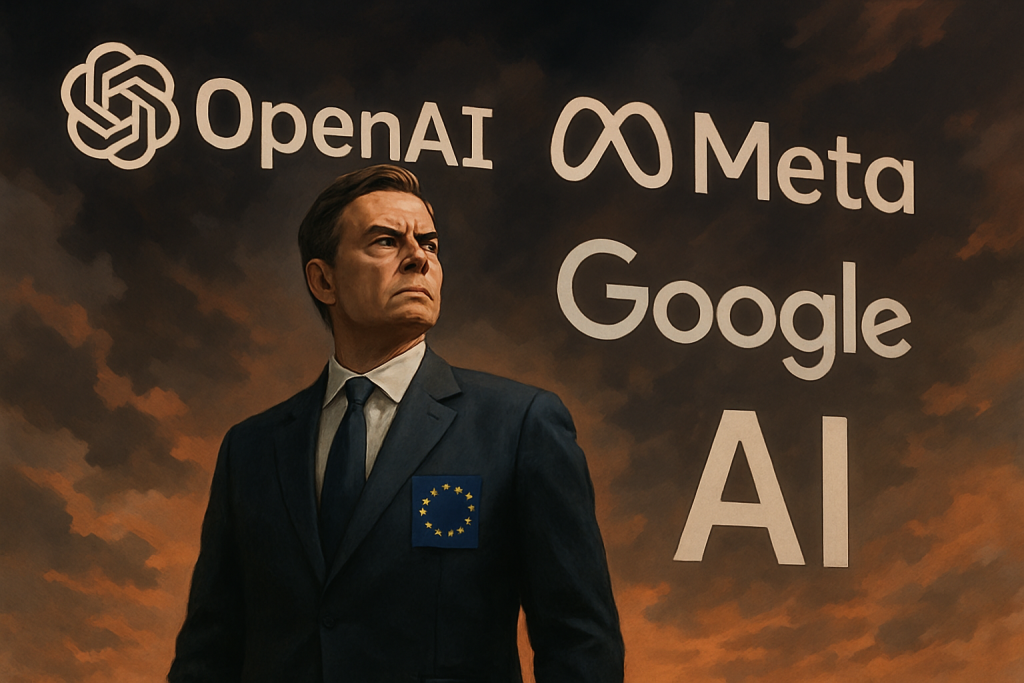Independence Day. July 4th. While Americans were firing up the grill and watching fireworks, a different kind of declaration was being made across the Atlantic. The European Commission, facing down a chorus of Silicon Valley giants, doubled down on its commitment to the Artificial Intelligence Act (AI Act), refusing to grant the tech world’s wish for a delay. Think of it as Europe’s AI version of “Hold the line!” a defiant stand against the perceived overreach of Big Tech.
But what exactly is this AI Act that has companies like Google (via Alphabet), Meta, and even the Dutch lithography wizards at ASML sweating? And why are they so desperate for a reprieve? Let’s dive in.
The AI Act, in a nutshell, is the EU’s attempt to tame the Wild West that is artificial intelligence. It’s a comprehensive piece of legislation designed to ensure AI systems are safe, trustworthy, and respect fundamental rights. Imagine it as the GDPR of the AI world, but instead of just protecting your data, it’s trying to protect you from potentially harmful AI applications.
The core concept is risk-based regulation. The Act categorizes AI systems based on their potential for harm, with the highest-risk applications facing the strictest scrutiny. We’re talking about things like AI-powered facial recognition in public spaces, AI used in critical infrastructure, or AI systems that could discriminate against individuals based on protected characteristics. These high-risk systems will be subject to rigorous testing, transparency requirements, and human oversight.
But here’s the rub: The Act also includes provisions for general-purpose AI models, the kind that power everything from chatbots to image generators. And these provisions are slated to kick in fast, with obligations starting in August 2025. That’s what has the tech titans in a tizzy.
Think of it this way: It’s like the EPA deciding to regulate car emissions. At first, it’s just about catalytic converters on gas guzzlers. But then, they start looking at the entire lifecycle of the car, from the mining of the raw materials to the eventual recycling. That’s the kind of broad scope the AI Act is aiming for.
In the weeks leading up to the Commission’s announcement, a wave of appeals poured in from the tech sector. These companies argued that the compliance costs associated with the AI Act would be astronomical, potentially stifling innovation and putting European businesses at a disadvantage compared to their counterparts in the US and China. They painted a picture of European startups being crushed under the weight of red tape, unable to compete with the deep pockets of American and Chinese tech giants.
But the European Commission wasn’t buying it. In a statement that channeled the spirit of Gandalf facing down the Balrog, spokesperson Thomas Regnier declared, “There is no stop the clock. There is no grace period. There is no pause.” The message was clear: The EU is committed to its timeline, regardless of the pressure from industry.
So, what are the implications of this steadfast stance? Let’s break it down:
For Technology Companies: Buckle Up. Companies operating in the EU have less than a year to get their act together. That means pouring resources into legal and compliance teams, auditing their AI systems for potential risks, and potentially redesigning their products to meet the Act’s requirements. This isn’t just about ticking boxes; it’s about fundamentally changing how they develop and deploy AI.
For Innovation and Competition: A Double-Edged Sword. The AI Act aims to foster trust and safety, but some worry it could also stifle innovation. Will startups be able to afford the compliance costs? Will European companies be able to compete with their less-regulated rivals? It’s a valid concern, and one that policymakers will need to carefully monitor. It’s a classic case of competing priorities, like trying to simultaneously maximize speed and fuel efficiency in a race car.
For Global AI Governance: A Potential Ripple Effect. The EU often sets the standard for global regulation. Think about GDPR, which has influenced data privacy laws around the world. The AI Act could have a similar impact, inspiring other countries to adopt stricter AI regulations. This could lead to a more harmonized global approach to AI governance, but it could also create friction between regions with different regulatory philosophies.
The EU’s decision to proceed with the AI Act is a bold move, one that could reshape the future of artificial intelligence. It’s a high-stakes gamble, with the potential to create a safer, more trustworthy AI ecosystem, but also the risk of hindering innovation and competitiveness. Only time will tell if the EU’s gamble pays off, or if it ends up being a cautionary tale of good intentions gone awry.
But one thing is clear: the era of unfettered AI development is over. The regulators are here, and they’re not backing down.
Discover more from Just Buzz
Subscribe to get the latest posts sent to your email.


